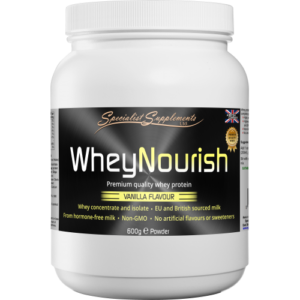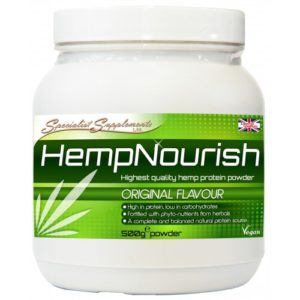Description
Product summary:
500g powder
NOTE: This product was previously called PEA Protein PLUS.
A high quality pea protein powder, blended with 9 other foods and herbs for additional nutrients: cinnamon powder, spinach powder, chlorella powder, acai berry extract (4:1), dandelion root powder, green tea powder (40% polyphenols), alfalfa powder, spirulina powder and baobab fruit powder.
Plant protein from snap peas
High protein food (19g per serving)
Complete amino acid profile
With 9 other foods and herbs
Source of dietary fibre (0.17g per serving)
Low in saturated fat
Easily digestible
Non-GMO
No hexane
Hypoallergenic
Dairy-free and gluten-free
No artificial flavours or sweeteners
Suitable for vegetarians and vegans
More information:
More about the ingredients…
Pea protein
This green protein shake mix contains a concentrated level of pea protein, from the 6% found in fresh peas up to around 80%, and is therefore high in protein (19g per serving). It is also low in saturated fat (0.17g per serving), easily digestible (no bloating) and suitable for vegetarians and vegans.
Protein contributes to a growth in muscle mass, the maintenance of muscle mass and the maintenance of normal bones.
Amino acid profile
Pea protein is a natural vegetable-source protein, which also offers an excellent amino acid profile. It provides:
- ‘branched chain amino acids’ (leucine, isoleucine and valine)
- lysine (an essential amino acid)
- glutamine (involved in protein synthesis)
- and is richer in arginine than any other commercially available protein.
Nutritional profile
Peas also contain:
- vitamins: including vitamin A, riboflavin, niacin, folate, thiamin, pantothenic acid, pyridoxine, vitamin B6,vitamin C and vitamin K
- minerals: including calcium, iron, zinc, magnesium, phosphorus, copper and manganese
- and other nutrients: including both soluble and insoluble dietary fibre, lutein (a nonprovitamin A carotenoid), phytonutrients / phytosterols (especially ß-sitosterol) and chlorophyll (a green pigment).
What’s more, peas are low in fat, calories, sodium and contain no cholesterol.
Easy to digest – no bloating
Pea protein is valued for its high digestibility (90-95%), low potential for allergic responses and reasonable price. It is particularly popular because it has a sweet taste and a texture which mixes well in liquid solutions. It is also useful for mixing into meals, such as soups and stews. Alternatively, it can be blended with liquids of your choice, as well as fruit (like banana) to make a tasty and healthy smoothie.
No ‘nasties’
Unlike many other pea protein powders on the market, PeaNourish contains no hexane or other toxic chemicals, which are often used during the pea protein extraction process. Our pea protein is extracted using only water, pressure and then flocculation.
Cinnamon
The cinnamon plant is a small, evergreen tree belonging to the family of Lauraceae within the genus, Cinnamomum. This spice is native to Sri Lanka, but is also now grown in many other countries such as Indonesia, Myanmar, Bangladesh, India and China. It contains flavonoids (such as carotenes, zea-xanthin, lutein and cryptoxanthin) and essential oils such as eugenol (a phenylpropanoids class of chemical compound that is responsible for its pleasant, sweet aromatic fragrance), ethyl cinnamate, linalool, cinnamaldehyde, beta-caryophyllene and methyl chavicol. It also contains vitamins and minerals like potassium, calcium, manganese, iron, zinc, magnesium, vitamin A, niacin, pantothenic acid and pyridoxine.
Spinach
Spinach contains iron, calcium, folic acid, vitamin K, vitamin C, fibre, carotenoids (such as lutein) and bioflavonoids.
Chlorella
Chlorella is a single-cell green algae, which is cultivated in large man-made freshwater ponds under artificially-controlled conditions. It contains protein (60%), including all of the essential amino acids, as well as vitamins B1, C, E and K and the carotenoids beta carotene and lutein.
Acai berries
The acai (pronounced ah-sigh-ee) berry is a small, dark purple palm fruit, indigenous to the Amazon rainforest. For hundreds of years, these berries have formed a staple part of the diet of native tribes. As a richly coloured fruit, acai berries naturally contain the purple pigments known as anthocyanins.
Dandelion root
The roots of the dandelion plant contain a complex carbohydrate called inulin, as well as vitamins (including A, B complex, C and D), minerals (including zinc, calcium, iron and potassium) and compounds called sesquiterpene lactones.
Green tea
Camellia thea, or green tea, is a source of catechin polyphenols – Epigallocatechin gallate (EGCG), in particular.
Alfalfa
Alfalfa is a source of chlorophyll, vitamins (such as pro-vitamin A (B-carotene, vitamins B6, C, D, E, K and P), minerals (such as calcium, magnesium, potassium, iron and zinc), dietary fibre and other nutrients (such as isoflavones, sterols, other plant phytoestrogens and derivatives of coumarin). It also contains all of the essential amino acids and 8 enzymes.
Spirulina
Spirulina is a blue-green microalgae. It contains between 55 and 70% protein (more than beef, chicken, and soybeans), 8 essential and 10 non-essential amino acids, as well as gamma-linolenic acid (GLA), beta-carotene, linoleic acid, arachidonic acid, vitamin K, pantothenic acid, magnesium, potassium, thiamin, riboflavin, niacin, iron, copper, manganese, nucleic acids RNA and DNA, chlorophyll and phycocyanin (a pigment-protein complex that is found only in blue-green algae).
Baobab fruit
Baobab fruit is native to Africa, growing on baobab trees (Adansonia Digitata L.). These trees are reported to live for up to 1000 years and are often localled referred to as “ancient trees of life”. The trunks can store in excess of 30,000 gallons of water, which help the trees survive long drought conditions. The fruit is found inside hard pods that hang upside down from the tree. The dried fruit powder of A. digitata contains various nutrients, including vitamin C, carbohydrates, pectin, riboflavin, calcium, magnesium, potassium, iron, phytosterols and fibre (both soluble and insoluble).
Usage:
As a drink: Mix 1 serving (25g / 4 heaped teaspoons) into water, fruit, vegetable juices etc. It can also be blended with berries and fruits, added to juices or sprinkled onto cereals for that extra nutritional boost and sweetness.
PeaNourish is a delicious dairy and sugar free pea protein with added culinary herbals. It can be added to a liquid of your choice and enjoyed at breakfast, lunch or any time of day.




Reviews
There are no reviews yet.